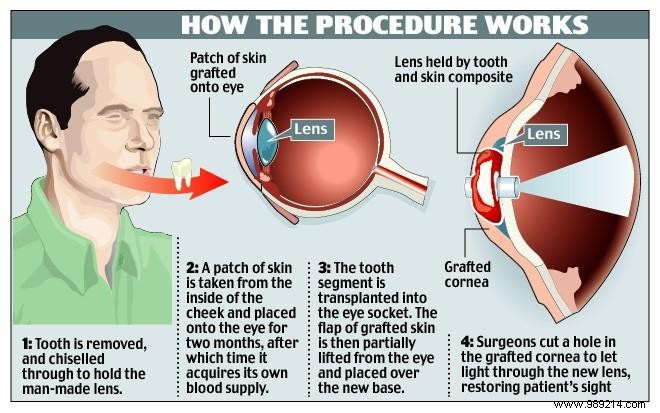In France, a duo of surgeons performs a very surprising operation with the aim of restoring sight to certain blind patients:the OOKP. This operation consists of using a tooth to implant an ocular prosthesis.
In addition to people suffering from blindness, no less than ten million people in the world suffer from a degenerative eye disease, including age-related macular degeneration (AMD) or macular dystrophy. And regaining sight is certainly the dream of all blind and partially sighted people. Research to achieve this is increasing. For example, researchers from the University of Melbourne (Australia) presented in 2016 a special technique:the transplantation of corneal cells using a hydrogel film grown in the laboratory.
The surgeons Louis Hoffart and Laurent Guyot of the Hôpital de la Timone in Marseille are the only ones in France to practice a technique that already exists, but is rarely used. Called Osteo-odonto-keratoprosthesis (OOKP), this method appeared in the 1960s with the work of the Italian Benedetto Strampelli (1904-1987). At the time, eleven patients in Belgium had benefited from the OOKP, of which eight had regained their sight.
In fact, it is a question of choosing a tooth of the patient as support for an ocular implant . After the removal of the tooth, the doctor places an optical tube there acting as a camera. Then, the tooth is implanted in the patient's cheek for four months so that it becomes familiar with the mucous membranes and blood vessels. Finally, the tooth ends up with the flesh directly in the eye socket of the patient.

You should know that a few conditions must be met to benefit from the OOKP. First, the operation is only for patients blind in both eyes . In addition, these patients must first have followed a conventional care pathway that would not have worked. In other words, the OOKP represents a last chance operation although the chances of rejection of the implant are quite low. In reality, the main obstacle for the patient is rather on the side of the cost of the operation:30,000 euros. Thus, the operation is considered only if nothing else has worked and the chances of success are very high.
The patient must also pass a large battery of tests to ensure that the optic nerve and the retina are fully capable of receiving information and transmit them to the brain. It must be said that in the event that the eye no longer works at all and that it does not perceive any light, the implant will prove to be completely useless. At a time when retinal implants are the subject of many projects and studies today, OOKP is a pioneering technique in the field . Far from being obsolete, because still efficient, it remains extremely rare.